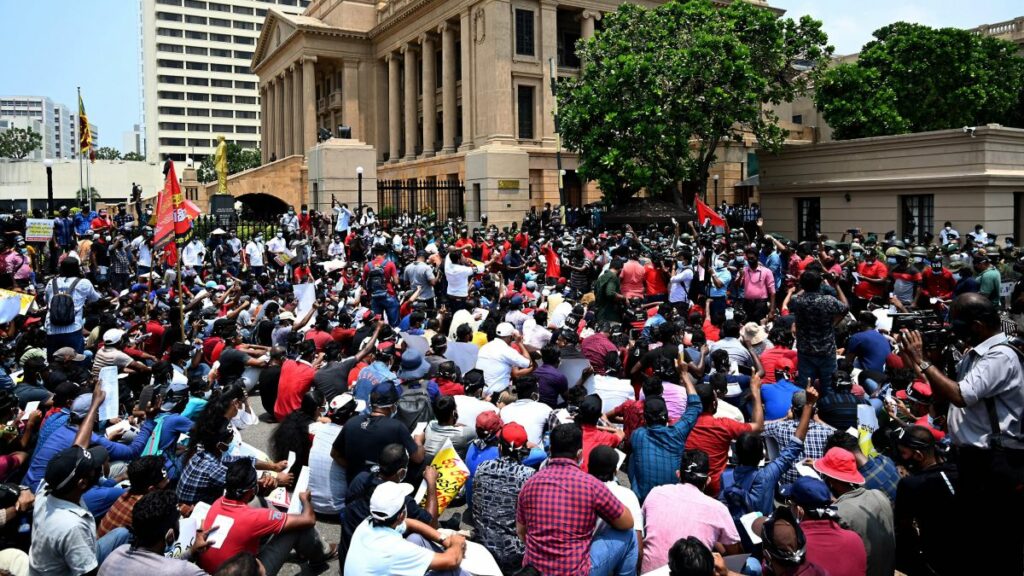Manas Dasgupta
NEW DELHI, April 19: As Sri Lanka reported the first casualty in the current anti-government protests in police firing on the demonstrators, the prime minister promised change in the constitution to clip presidential powers and empowering Parliament to take key decisions.
The police in Sri Lanka for the first time since anti-government protests over an economic crisis started fired at protesters on Tuesday killing one and injuring several people. A police spokesperson confirmed they had to fire at the protesters after the mobs turned violent and threw stones at them.
The people had blocked a highway in central Sri Lanka’s Rambukkana, 95 kilometres from capital Colombo, to protest acute oil shortages and high prices. A severe fuel shortage sparked spontaneous protests across Sri Lanka on Tuesday with tens of thousands of angry motorists burning tyres and blocking the major road leading into the capital.
Sri Lanka has run out of dollars to finance vital imports including food, medicine and fuel, sparking weeks of protests calling for the resignation of President Gotabaya Rajapaksa in the country’s worst economic crisis since independence in 1948.
The highway where the protest took place connects the central city of Kandy to capital Colombo. It was cut off at multiple stretches as fuel stations across Sri Lanka ran out of petrol and diesel. Main oil retailer Ceylon Petroleum Corporation raised prices by up to 64.2 per cent and lifted a rationing system to limit how much fuel individuals could buy that had been implemented last week. Lanka IOC, a petrol retailer which accounts for a third of the local market, had already raised its prices by up to 35 per cent on Monday.
Motorists have joined throngs of protesters in Colombo who have been calling for Rajapaksa to step down for 11 straight days. Doctors at the country’s main children’s hospital also began protesting on Tuesday over a serious shortage of medicines and equipment. Sri Lanka is seeking up to $4 billion from the International Monetary Fund to overcome its balance-of-payments crisis and boost depleted reserves.
As the country continued to plunge into chaotic economic conditions blamed on the president’s wrong priorities and decisions, Prime Minister Mahinda Rajapaksa told Parliament that the power transfer would be one of the quick steps that could be taken to politically stabilize the country and help talks with the IMF for an economic recovery plan.
“While looking for solutions to the economic problems, it is important that we have political and social stability in the country,” Rajapaksa said, adding that reverting to a constitutional status with more powers to Parliament will be start to the reforms. President Gotabaya Rajapaksa, who is the Prime Minister’s brother, concentrated more powers in the presidency on being elected to the office in 2019.
President Rajapaksa on Monday admitted that he made mistakes like delaying going to the IMF for help and banning agrochemicals with the aim of converting Sri Lanka’s agriculture to fully organic, leading to the crisis. However, both the President and Prime Minister have refused to step down, resulting in a political impasse. Opposition parties have rejected the President’s offer to join a unity government, but they are unable to hold a majority in Parliament and form a new government.
In a cabinet reshuffle on Monday, the President appointed many new faces and left out four family members who held Cabinet and non-Cabinet ministries in what seemed an attempt to please the protesters without giving up his family’s grip on power. The Rajapaksa brothers are likely to retain their same grip on power even if the constitution is amended, since they hold both offices.
Sri Lanka is on the brink of bankruptcy, with nearly $7 billion of its total $25 billion in foreign debt due for repayment this year. A severe shortage of foreign exchange means the country lacks money to buy imported goods. The people have endured months of shortages of essentials like food, cooking gas, fuel and medicine, lining up for hours to buy the very limited stocks available.
Last week, the government said it was suspending repayment of foreign loans pending talks with the IMF. Finance Minister Ali Sabry and officials left for talks with the IMF on Sunday. The IMF and World Bank are holding annual meetings in Washington this week and has also turned to India and China for emergency loans to buy food and fuel.

